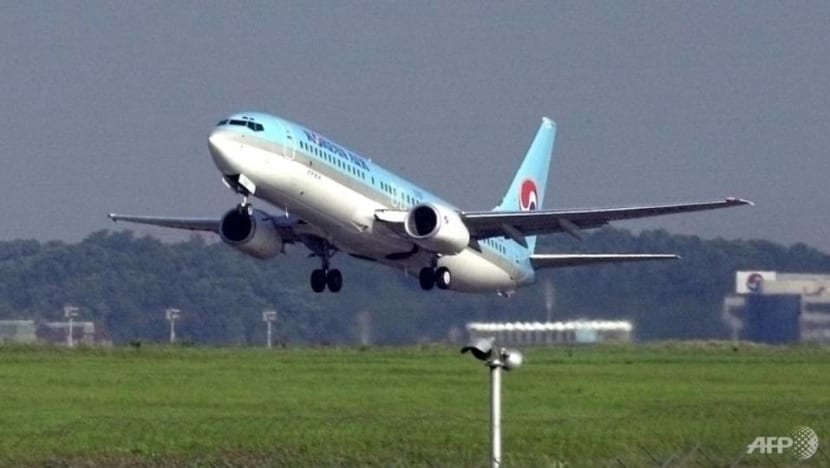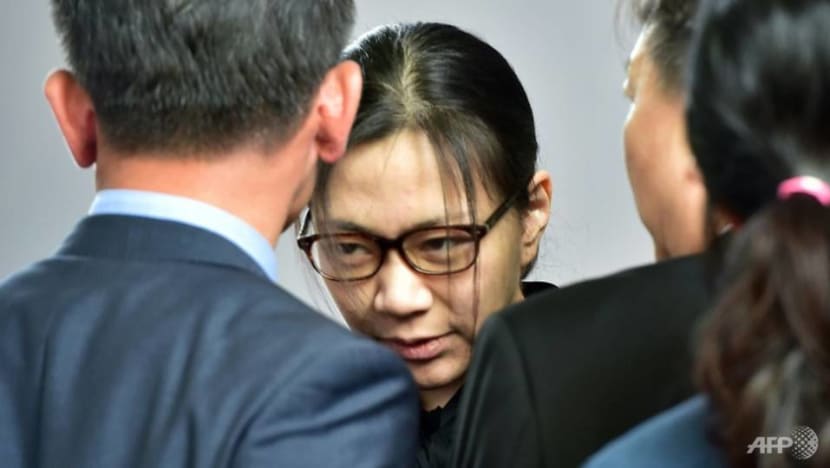commentary Commentary
Commentary: South Korean workers have been bullied for far too long
The new law that mandates punishment for South Korean companies found to have unfairly demoted or fired workers who are harassed while on the job is a positive step forward, says Steven Borowiec.

Yang Jin-ho is seen here abusing his employee in this screengrab from a youtube video (Image: Youtube/Newstapa)
SEOUL: At its beginning, the video appears to show a typical scene of office life in South Korea, with three men standing amid desks and computers under fluorescent lighting.
Then, the tense silence is shattered as one man brutally smacks another across the face.
The victim does not retaliate, but merely lowers his head in a posture that combines fear and contrition.
The violence and intimidation don’t stop there. The perpetrator, since identified as Yang Jin-ho, at the time a successful CEO of WeDisk and robot developer K-Technology, continues berating the victim, then viciously assaults him again.
Yang then orders the man to get on his knees and apologise, before striking him over the head one final time and then walking away.
The video leaked in October 2018, and contributed to South Korean public outrage with what is called gabjil, a Korean word that refers to more powerful people abusing their status to mistreat underlings.
Institutions in South Korea - schools, the military, workplaces - generally function according to strict norms of age-based hierarchy, leading to situations where someone further up the ladder tends to mistreat someone below them, all while comfortable in the knowledge that, according to social customs of deference to authority, underlings will generally, like the man in the video, silently accept their treatment.
READ: Youths are underpaid, bullied and exploited in their first jobs, a commentary

WORKPLACE BULLYING
The video featuring Yang is an extremely graphic case. The employment of gross violence is less common in South Korean workplaces.
Gabjil is usually more subtle. It could be a lazy project manager dumping his or her work on a staff member, then taking credit for the work once it’s done. Or a boss ordering a junior staff to help with their children’s essays. Or a senior colleague forcing a new hire to bow down in deference each time he or she passes by in the corridor.
This week, new legislation in South Korea could signal a step toward keeping workplaces safer from bullying. The new law mandates punishment for companies found to have unfairly demoted or fired workers harassed while on the job.
The law is intended to provide legal protection for workers who call out abuse, and motivate managers to prevent such bad behaviour.
READ: Address ragging but remember to also tackle workplace bullying, a commentary
The incident that brought gabjil to the centre of South Korea’s public conversation, and likely planted the seeds for the new law, was the infamous “nut rage” incident of 2014.
Cho Hyun-ah, heiress to the Korean Air empire, berated a crew member on her flight for serving her macadamia nuts in an unopened package instead of on a plate.

Cho reportedly made then Korean Air chief steward Park Chang-jin, kneel down in apology being ordering the plane to turn back to the terminal so Park could get off.
SPEAKING OUT
Following the incident, Park became a vocal proponent of changing the dynamics in Korean workplaces and giving victims of bullying room to speak out.
However, after giving a number of media interviews, Park was demoted from purser to flight attendant. He subsequently argued that his demotion was veiled punishment for having gone public with his grievances.
Korean Air contended that Park was demoted due to poor performance on an English test.
(When I interviewed Park last year, however, he could speak English proficiently.)
He also faced pushback in the form of colleagues who suddenly refused to speak to him.
He told me of one occasion where an elderly man confronted him at a restaurant and angrily accused him of bringing shame on South Korea.
Park said the man told him he didn’t understand how poor South Korea was just a couple of generations ago and that such strict hierarchies in business were necessary for the country’s development.
In short, the man was arguing that individuals should tolerate personal misfortune in the name of collective achievement.

One important aspect that the law doesn’t address is an even more powerful motivation that workers have to quietly tolerate mistreatment.
Today, competition for jobs in South Korea is intense, with an abundance of qualified candidates for a small number of well-paid, white-collar jobs at large companies.
Most people who have triumphed in this tooth-and-nail battle and found gainful employment will likely be inclined to keep quiet.
Though Park wasn’t fired, his case shows that speaking out can get one branded as a traitor or a troublemaker. Such a reputation could make it that much harder to find a job in an already-tough market.
Given the current climate, it remains to be seen how many people will feel comfortable resorting to the law, or how many convictions there will be.
NEW LAW A POSITIVE STEP
While this law isn’t a cure-all, it’s a positive step. It sends the message that it’s not okay to bully someone you perceive as weaker than you, even if you believe you’re serving some higher purpose.
It gives the imprimatur of the state to individual rights, and sends the message that dignity is worth protecting.
If you’ve watched the video of Yang more than once, after you get past the initial shock of the violence and the vulgarity of the insults, you might notice that in the frame are several other people, workers who throughout the encounter remain silent, some not even turning around to watch what’s going on.
Those who didn’t intervene or look up presumably felt too frightened or uncomfortable to risk their own well-being by stepping in to stop the assault.
READ: Are you a bullying manager? It's easy to tell, a commentary

The reality is that the video is something of a microcosm for society at large, where most people feel compelled to watch silently as harassment takes place – a form of bullying in of itself.
So despite its limitations, the law could encourage bullied South Korean workers and their colleagues who have had to bear witness to such despicable acts for far too long to speak up finally.
Steven Borowiec is the politics editor of Korea Expose.














